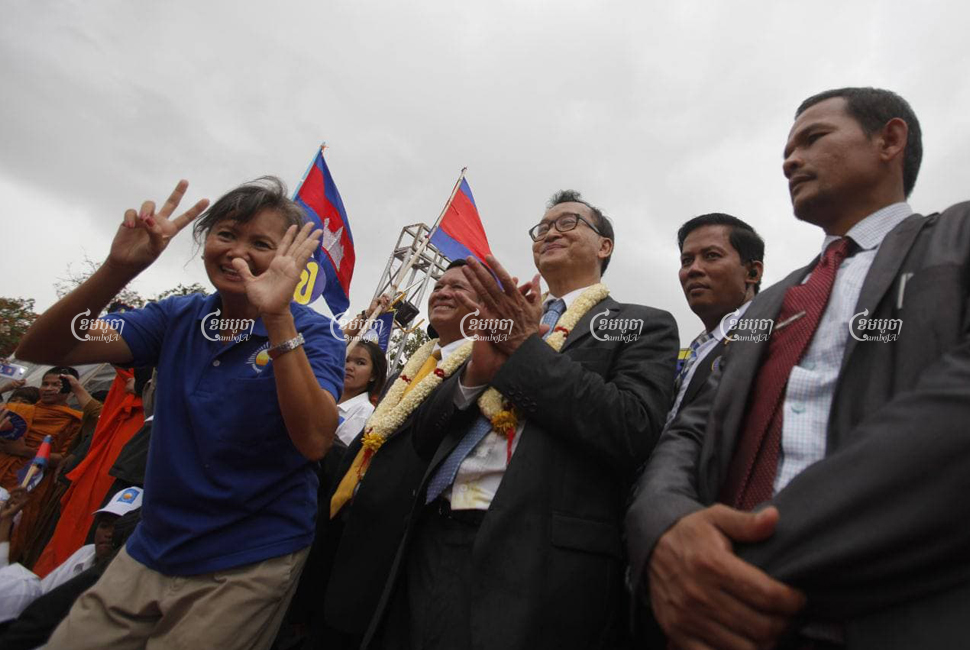Nine leaders of the outlawed Cambodian National Rescue Party have been sentenced to between 20 and 25 years in prison for their alleged roles in a 2019 coup d’etat, in one of a series of cases against opposition figures that have been labeled a “mockery of justice” by observers.
The nine – including former party president Sam Rainsy and deputies Mu Sochua and Eng Chhay Eng – were sentenced by the Phnom Penh Municipal Court in absentia for their attempted “attack,” which consisted of social media messages calling for people to stand against the government and pledges to pay military personnel to defect.
“[The court] handed down additional penalties, depriving them the right to vote and contest elections,” defense lawyer Kao Seyha said, adding that each was ordered to pay a fine of 180 million riel – more than $44,000.
Rainsy was sentenced to 25 years in prison; Sochua and Chhay Eng 22 years each, and former lawmakers Ou Chanrith, Ho Vann, Long Ry Men Sothavrin, Tiolung Saumura and Nuth Romduol received 20-year sentences, Seyha said.
The trial and charges have been widely condemned alongside a series of parallel trials against opposition leaders, members and supporters – all linked Rainsy’s failed plan to return to Cambodia and “restore democracy.”
Social media messages and a meeting between opposition leaders in the United States were presented as evidence of the attempt to overthrow the world’s longest-serving prime minister – alongside pledges from Rainsy to provide funds for soldiers who would defect.
“We do not care about the convictions because we know that in our struggle to bring democracy, the court and dictatorship will be brought to an end,” Rainsy said from his home in Paris in a live interview with Radio Free Asia following the verdict.
“It is meaningless. The issue is entirely politically motivated,” he said, adding that his lawyers would appeal the verdict.
Sochua – who was among dozens of opposition figures to have their Cambodian passports revoked amid the demolition of the CNRP and campaigned to be allowed to return to Cambodia to face trial – said the verdict was unacceptable.
“This is a mockery of justice on the order of the Cambodia’s ruler, Mr. Hun Sen”, she told CamboJA by email.
“No defendants were allowed at the mass trials in violation of their rights stipulated in Cambodia’s laws and the International Covenant on Civil and Political Rights”, she added.
CNRP officials and affiliates have been under fire since the party was dissolved by the Supreme Court in 2017 after having made significant gains in national and commune elections.
Rainsy fled Cambodia in 2015 amid mounting charges against him; Sochua and others fled following a nighttime raid on the home of co-founder Kem Sokha, who is on trial for treason.
More than 150 other party members and affiliates are also defendants in mass trials that have been criticized for failing due process. 118 of the party’s senior officials are banned from politics.
With local and national elections in 2022 and 2023, the convictions were an effort to “slam the door on these exiles ever returning to Cambodia,” Human Rights Watch’s deputy Asia director said in a statement.
“In each of these political show trials, the temptation is to say that Cambodia cannot sink any lower in its violation of human rights, but somehow Prime Minister Hun Sen and his colleagues find a way to reach a new nadir,” Phil Robertson said.
“There seems to be no limits to the violations of human rights this government will inflict on the Cambodian people.”
Government lawyer Koun Saroeun welcomed the court’s decision, having lobbied for maximum punishment.
“The court has sentenced based on law,” he said. “So, I do not have any further comment.”
Am Sam Ath, deputy director at rights group Licadho, said that sentencing did not bode well for other CNRP members and affiliates on trial for their various roles in the so-called coup attempt on 2019.
“This verdict opens the way for a pattern of verdicts. The next verdict will be the same,” he said.
Based on previous experience, however, it is likely that convicts could be pardoned in a political compromise, he said.
Court spokesman Y Rin told CamboJA that the other CNRP trials had been delayed until after March 12.
Political analyst Em Sovannara said the conviction did nothing to build the public’s trust on Cambodia’s much-criticized judicial system.
“[The public] can see that politicians are influential, related to this trial,” he said. “When politicians have chanted, the court has seemingly followed.”








